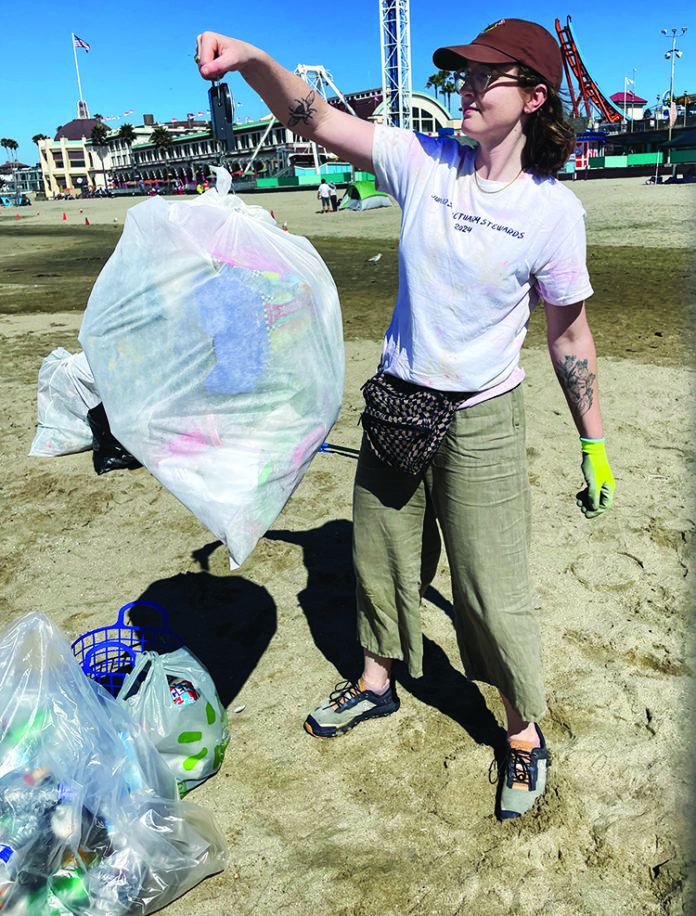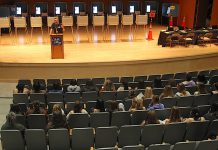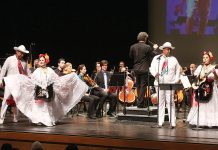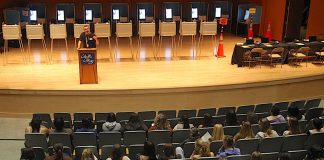
The Fourth of July has long been a time of celebration in Santa Cruz County, a height-of-summer fete that draws hordes of people to local beaches to indulge in picnics, swim in the ocean, soak up the sun and, for some, trash the place.
But for residents and organizations that strive to keep local beaches clean, the holiday also means day-after labors of removing hundreds of pounds of trash the revelers leave behind.
Beach cleanup days are nothing out of the ordinary for Save Our Shores (SOS), a Santa Cruz nonprofit that hosts weekly events for volunteers.
The organization works for policy change and provides community education to help keep Monterey Bay clean and healthy.
But those efforts are redoubled on July 5, after a holiday that seems to bring out the worst in litterbugs.
“It’s not unusual to find entire picnics left behind,” said Save Our Shores Volunteer and Outreach Coordinator Sam Rupel, who was overseeing a team of 15 volunteers at Cowell Beach.
This includes piles of debris from takeout meals, Rupel said.
As of 10am Friday, volunteers had collected nearly 20 bags of garbage, each weighing in at 15 pounds.
“It was really, really bad,” Rupel said.
With plastic waste coming in as the number-one item found by volunteer crews, cigarette butts are also a pernicious part of the waste left behind.
Made from plastic fibers, the butts take as long as 15 years to break down, and even then leave micro-plastic waste behind. They also leach toxins into the environment such as lead and arsenic.
For that reason, SOS is working with the Santa Cruz County Board of Supervisors to craft an ordinance that would ban the sales of filtered cigarettes in the county.
The board will likely consider the ordinance in the fall, Supervisor Manu Koenig said.
On its website, SOS says it has collected 439,358 cigarette butts between 2013–2023 from beaches, open spaces, and public areas.
The ordinance, if passed, would be a significant change, and a shot across the bow of the powerful tobacco industry.
Cleaning the beaches—and categorizing the trash found—is a way to bolster those efforts and add hard data to the discussion, Rupell said.
“That’s why we need the real numbers of what we’re finding—and on what beaches and when—so we have hard evidence of what the issue is and how big the problem is,” she said.
UC Santa Cruz chemistry professor Rebecca Braslau, whose team is working on methods to break down post-consumer plastic and turn it into something useful, was collecting trash to get a boots-on-the-ground view of the scope of plastic waste.
“We try to raise awareness about single-use plastic items in general, and this is part of that,” she said.
Braslau said that half the popular beach, which is in front of the Santa Cruz Beach Boardwalk, had already been cleaned by city workers.
“Then we got out here and it was disgusting,” she said.
Among other things, the crew found clothes, propane tanks, used diapers, a partially opened bag of flour, a golf club and “everything having to do with plastic trash.”
“This is the worst day of the year in terms of beach cleanups,” Braslau said.











Here is a novel idea! Send the homeless out to clean up our beaches and streets like WPA of the past. Yes let’s give them low cost homes and make them work to earn their keep and give them pride in their lives!
Hear!~ Hear!
“Green California” needs to follow Norway and New York City in establishing Waste to Energy Plants,
turning waste to electricity unstead of burying it in the ground…
Google pays $300 on a regular basis. My latest salary check was $8600 for working 10 hours a week on the internet. My younger sibling has been averaging $19k for the last few months, and he constantly works approximately 24 hours. I’m not sure how simple it was once I checked it out.
This is my main concern………. https://eorkshigh.blogspot.com